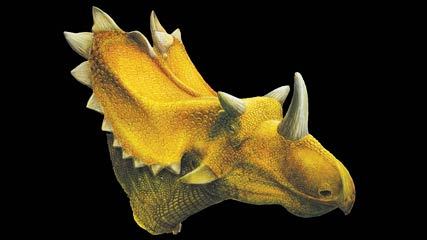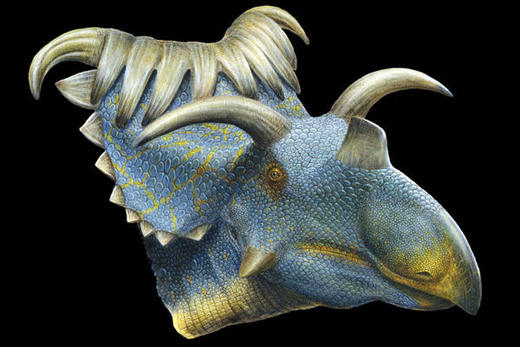Who Knew Dinosaurs Could Look So Cool?
Language
Reading Level
Listen to Article

Dinosaurs usually invoke images of large scary looking monsters. However, the recently unearthed fossils of two exotic species - Ones with multiple horns or spikes on their heads definitely, debunk the conventional image.
Discovered in Southern Utah, these handsome plant-eating vertebrates are related to the famous Triceratops or three-horned dinosaurs that roamed the mainland, about 65 million years ago.

The larger of the two has been named Utahceratops or Utah horned face thanks to the five horns that stuck out from the side of its oversized 7-feet long skull. Believed to be roughly 18-22 feet long and about 6 feet tall at the shoulder, scientists estimate that this behemoth weighed between 6,600 to 8,800 pounds or slightly more than a pick-up truck!
While this was fascinating, it is the other find that has the paleontologists buzzing — the Kosmoceratops, or ornate faced (Latin) dinosaur is the most exotic species ever discovered. The 15 foot long creature had 15 spiky horns, distributed all across its face - over the top of each eye, the nose, at the tilt of each cheekbone and the rest distributed across the rear portion of its skull.

Calling it one of the most bizarre looking animals they had ever found, the scientists believe that the horns were not used as weapons to attack prey, but as a strutting tool to attract female dinosaurs, similar to peacock feathers! This creature was slightly smaller than the Utahceratops, weighing in at mere 2,500 lbs.
The fossils were discovered in the Grand Staircase-Escalante National Monument, in Southern Utah. Once a warm swampy area where these large dinosaurs thrived, it is now an inhospitable dry rocky desert. Researchers live in remote camps that are often 90 minutes from the nearest water source and often have to walk for miles to get to the dig sites, dragging behind them all their heavy equipment. If that is not enough, they often get bitten by rattlesnakes or stung by scorpions.

However, for the paleontologists the hardship is well worth it, for besides these two handsome creatures, they have found many more in this area, that is labeled as North America's last remaining graveyard of dinosaurs - And, they have no idea what they will stumble upon next!
Sources:internetbits.com, csmonitor.com,nationalgeographic.com,aolnews.com
Cite Article
Geography
Learn Keywords in this Article
145 Comments
- Obi-wan kenobiover 9 yearswow
- earsover 9 yearscool i love dinos
- popcornpop23almost 10 yearsi was born in utah too!!!!!!!!!
- Velociraptor almost 10 yearsI LOVE DINOSAURS
- kgr04about 10 yearscool, i was born in utah!!!!!!
- dinofanabout 10 yearsi love dinosaurs !!!!!!!!!!!!!!!!!!!!!!!!!!!!!!!!! and everyone knows those dinos
- ghostman55over 10 yearscool
- Harrisonabout 11 yearsNot cool
- Lopezabout 12 yearsAwseome
- tj0701over 12 yearsi love dinos :D



